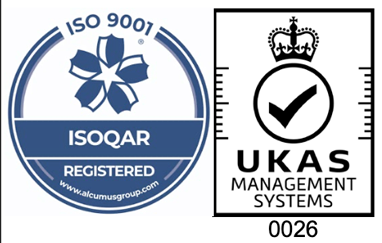The Role of Nitrile Watertight Seals in the Oil and Gas Industry
11th August, 2025
Nitrile rubber, sometimes known as Buna-N or NBR, is a synthetic rubber known for its oil, fuel and chemical resistance.
Watertight hatch seals are used across several applications in the marine industry, including offshore oil and gas rigs, to prevent water, dust, dirt or other harmful substances from entering a vessel or structure and causing damage.
This guide will highlight the importance of nitrile watertight seals in the oil and gas industry, discuss how it is made, why it is so useful for oil and gas applications and where watertight seals will be used in the industry.
What is Nitrile?
Nitrile rubber is a type of synthetic rubber first developed in the 1930s as a substitute for natural rubber. Its range of unique properties, including oil and chemical resistance, make nitrile ideal for several industry applications, including aerospace, motorsport and automotive, medical and industrial applications.
It is in these industrial applications that nitrile rubber seals, like watertight seals, are crucial. These seals offer unmatched sealing effectiveness and reliability in the oil and gas industry and are used across multiple vessels, like oil and gas tankers, or to provide sealing solutions for oil and gas rigs which are exposed to the elements.
How is Nitrile made?
Nitrile rubber is created by emulsifying butadiene and acrylonitrile in water, then polymerising the result. The ratio of these two products can be adjusted to suit the required characteristics of a specific application, such as the flexibility or oil and gas resistance. These nitrile rubber extrusions are manufactured to create the required shape through an extruder, which uses pressure and temperature to extrude continuous lengths of the rubber profile, to create bespoke sealing solutions. It can also be manufactured as flat sheets of rubber if it is needed for use in cushioning applications, like rubber seals.
Properties of Nitrile Rubber
Nitrile’s range of unique properties make it suitable for use in products that will come into contact with oils, fuels, alcohols, hydraulic fluids and chemicals.
Oil and Fuel Resistance
Nitrile’s most sought-after property is its high resistance to oils, fuels and petroleum-based fluids. Should a nitrile watertight seal be needed for an application that is exposed to oils, fuels or petroleum-based fluids, it will be a long-lasting and reliable choice to use in these applications.
It is important to note that the level of oil resistance can vary depending on the amount of acrylonitrile present in the rubber compound because a higher amount makes the rubber less resistant to swelling from oil contact, but the seal can become stiffer at low temperatures. The oil and fuel resistant nature of nitrile makes it a widely used rubber product.
Chemical Resistance
As well as its high resistance to oil and fuel, nitrile rubber is also extremely resistant to a range of other chemicals. Most rubber compounds will degrade if they come into contact with harsh chemicals, whereas nitrile performs well against a variety of chemicals, including acids and solvents.
Temperature Resistance
Nitrile has an operating temperature range of -40°C to 120°C. Other rubber materials may have a higher operating range, like silicone rubber, but they have poor resistance to oil and fuel, meaning they are not suitable for applications in industries like oil and gas. The temperature range of nitrile also makes it an abrasion resistant material.
Durability and Elasticity
Nitrile rubber is known for its durability and elasticity which are reflected in its long service life. It can be used in tough and dirty industrial applications, like engine hoses, o-rings and watertight seals. Nitrile seals demonstrate strong elasticity, since they are unlikely to be stretched during installation and when in use in their application.
Nitrile also shows a good resistance to compression set, meaning seals manufactured from nitrile rubber are able to maintain their shape and sealing properties, even after prolonged periods of compression.
Where is Nitrile used in the Oil and Gas Industry?
Choosing the right marine rubber is essential, especially for vessels or offshore structures, like oil and gas rigs. Nitrile rubber products, like watertight hatch seals, have multiple uses in the oil and gas industry and are extremely vital in these offshore operations.
Seals are key components for the operation of oil and gas rigs and seals used in these applications must withstand high temperatures and a chemically hostile environment, meaning nitrile is a suitable choice for use in the oil and gas industry. Structures in the industry use rotating equipment, like pumps, agitators and compressors, and valves, pipes and ducts which carry gases and liquids, must all be reliably sealed.
Watertight hatch seals are an essential component for offshore oil and gas applications, including fuel transport and sealing mechanisms, as well as the vessels used to transport oil and gas from rigs to shore.
Nitrile for Fuel Transport
Because of its resistance against most fuels, oils and greases, nitrile is used in fuel transport applications, like hoses and pipes, to ensure the safe transportation of oil and gas from rig to shore. Nitrile can be used in watertight seals, as well as rubber seals, rubber hoses and tubing, and rubber gaskets to ensure the safe transportation of oil and gas.
Equipment like subsea connectors which include pipelines, require seals for creating reliable connections in harsh underwater environments and valves to control the flow of fluids and maintain pressure integrity.
Nitrile for Sealing Applications
Nitrile watertight rubber hatch packing seals can be used across a wide variety of applications on oil and gas rigs, and are essential for preventing leaks of fluids into the surrounding environment – which would cause financial damage to the rigging company but also environmental damage to the marine environment – as well as maintaining pressure integrity in various systems.
These nitrile seals are used to prevent leaks in pumps and compressors, in heat exchangers to separate fluids and maintain heat, as well as in drilling equipment to ensure these operate smoothly.
Nitrile for Vessels
Nitrile is used across a range of applications on vessels which are used to transport oil and gas. Watertight hatch seals are a vital aspect of any vessel to provide a barrier against water and other elements.
Elsewhere on vessels, nitrile is used in the fuel systems to ensure safe transportation of fuel, engine and hydraulic systems where resistance to oil and fuel are paramount and in preventing oil leakage in rotating parts.
Choosing Aquaseal Rubber for your Watertight Seals
Choosing bespoke rubber products is essential for any project, since they offer tailored precision, optimised performance and cost-effectiveness.
At Aquaseal Rubber, we produce watertight seals in nitrile rubber – as well as a range of other materials – to support your oil and gas industry application.
Contact us to discuss your custom project and see how our team can help.


